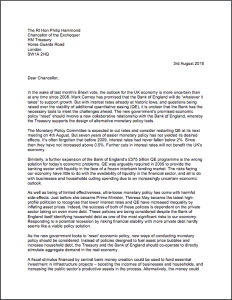Leading economists to Chancellor: time to support alternatives to quantitative easing


35 leading economists sent an open letter to Philip Hammond asking that he supports a new form of monetary policy. Responding to concerns expressed by the Prime Minister that low rates and quantitative easing have disproportionately benefited the wealthy, the letter argues that new monetary policy tools could stimulate the economy without contributing to inequality.
This intervention came on the day that the Bank of England voted to cut interest rates and restart its quantitative easing programme.
The letter calls on the Chancellor to investigate alternative ways of transmitting central bank money directly into the real economy, such as via a citizens’ dividend, housebuilding programme or investment in infrastructure.
The letter argues that more QE is likely to be ineffective because it relies on an already highly leveraged household sector to borrow even more. The economists “urge the new government to consider alternative policy approaches which will directly increase spending and investment in the real economy without burdening households with yet more debt.”
This letter was coordinated by Positive Money and was published in the Guardian along with an article that attracted over 1,700 comments within 24 hours. The Independent and CityAM and several other media reported about it.
Fran Boait, director of Positive Money, said:
”Theresa May recognises that low rates and QE have contributed to inequality, but the Bank of England is expected to double-down on the same failed policies. If the new Government is serious about building an economy that works for everyone, it should start by giving the Bank of England new tools to stimulate the economy without the toxic side-effects”.
The full list of signatories is as follows:
Andrew Watt, Macroeconomic Policy Institute, Hans-Böckler-Foundation
Avner Offer, University of Oxford
Biagio Bossone, Chairman of the Group of Lecce
Christian Marazzi, University of Applied Sciences and Arts of Southern Switzerland
Constantin Gurdgiev, Trinity College Dublin
David Boyle, Radix
David Graeber, London School of Economics
Ellen Brown, Pubic Banking Institute
Eric Lonergan, economist & writer
Fran Boait, Positive Money
Fulvio Corsi, City University of London
Guy Standing, School of Oriental and African Studies, University of London
Helge Peukert, University of Erfurt
Herman Daly, University of Maryland
Iqbal Asaria, CASS Business School
Jem Bendell, University of Cumbria
John Weeks, School of Oriental and African Studies, University of London
Joseph Huber, Martin Luther University of Halle-Wittenberg
Josh Ryan-Collins, New Economcs Foundation
Kaoru Yumaguchi, Doshisha Business School
Kees van der Pijl, University of Sussex
Ladislau Dowbor, Pontifical Catholic University
Laurence, Seidman, University of Delaware
Luca Ciarrocca, macroeconomic author
Livio Di Matteo, Lakehead University
Mark Blyth, Brown University
Mary Mellor, University of Northumbria
Matthias Kroll, World Futures Council
Nigel Dodd, London School of Economics
Ole Bjerg, Copenhagen Business School
Philip Haynes, University of Brighton
Lord Robert Skidelsky, Warwick University
Steve Keen, Kingston University
Thomas Fazi, Social Europe
Tim Jackson, University of Surrey
Victoria Chick, University College London